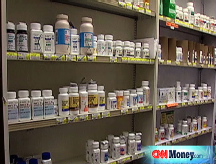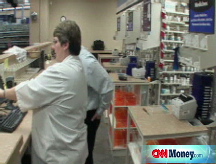Eli Lilly pleads guilty to 'off-label' drug marketing
Drugmaker to pay $1.4 billion for illegally promoting psychiatric drug for uses not approved by FDA.
NEW YORK (CNN) -- Pharmaceutical giant Eli Lilly and Company pleaded guilty Friday to a misdemeanor charge of marketing one of its medicines for uses not approved by the Food and Drug Administration, authorities said.
The company was ordered to pay more than $1.4 billion as part of the plea agreement and a civil settlement. The sum includes a criminal fine of $515 million, which the Justice Department has said is the largest criminal fine for an individual corporation ever imposed in a U.S. criminal prosecution.
Eli Lilly (LLY, Fortune 500) will also pay $800 million as part of a civil settlement with states and the federal government, and forfeit $100 million in assets. The total penalty is $1.415 billion.
The punishment stems from what the Justice Department calls "off-label promotion" of the drug Zyprexa. The drug was approved by the FDA for treatment of schizophrenia and certain types of bipolar disorder.
But, according to federal prosecutors, Eli Lilly illegally marketed the drug as a treatment for sleep disorders and dementia in elderly patients and touted the drug's known side effect of significant weight gain as a therapeutic benefit.
"Even though the company disagrees with and does not admit to the civil allegations, the company has agreed to settle the dispute," Eli Lilly said in a statement issued earlier this month, at the time the agreement was reached.
John Lechleiter, chairman, president and chief executive officer of Eli Lilly, said: "We deeply regret the past actions covered by the misdemeanor plea."
The government alleged that "Eli Lilly's management created marketing materials promoting Zyprexa for off-label uses, trained its sales force to disregard the law and directed its sales personnel to promote Zyprexa for off-label uses," the Justice statement said.
Under the Food, Drug, and Cosmetic Act (FDCA), a company must specify the intended uses of a product in its new-drug application to the FDA. Once approved, the drug may not be marketed or promoted for other uses. ![]()



